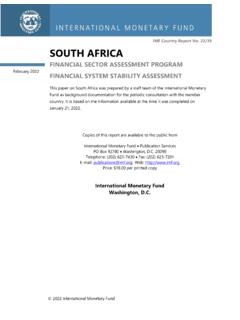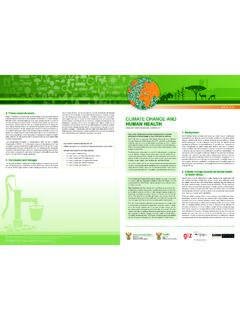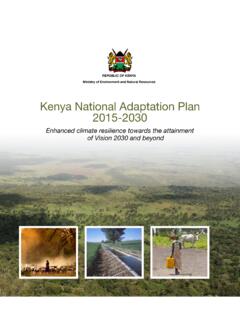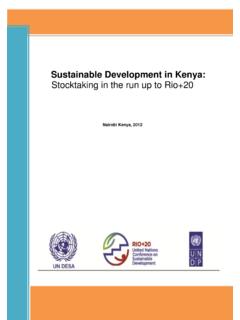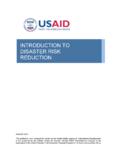Transcription of The Role of United Nations Peacekeeping Operations in ...
1 The Role of United Nations Peacekeeping Operations in Addressing Local ConflictsThe Role of United Nations Peacekeeping Operations in Addressing Local Conflicts2 The Role of United Nations Peacekeeping Operations in Addressing Local ConflictsACKNOWLEDGEMENTSThe Government of Japan provided generous support to this study, which was made possible by the contribution of decision makers and expert practitioners in DPKO headquarters and UN Peacekeeping Operations . We wish to thank mission leadership, civilian, and military personnel who met with us during our field visits, as well as Peacekeeping staff who engaged in informal phone interviews. We wish also to thank all those that have contributed with thoughts, comments and feedback during the consultation phase and in particular colleagues from the Department of Political Affairs, UN Habitat, OCHA, PBSO and UNDP, as well as scholars and practitioners from the Center for International Peace Operation (ZIF), the Stimson Center, the Norwegian Institute of International Affairs (NUPI) and the Global Public Policy Institute (GPPi).
2 A particular thank goes to all the participants to the workshop hosted in Kampala from 2 to 3 June 2016 especially colleagues from MINUSCA, MINUSMA, MONUSCO, UNAMI, UNAMID, UNMISS, UNOCI and UNSOM as well as Interpeace, International Alert, Search for Common Ground and Swisspeace. United Nations 2017 United Nations Departments of Peacekeeping Operations and Field Support Policy, Evaluation and Training Division Policy and Best Practices Service Authors: DPKO-DFS/DPET/PBPS Civil Affairs Team Tom O Bryan, Sara Rendtorff-Smith, Marco Donati (ed.)Cover image: UN Photo/Stuart PriceLayout and Printing: UNON/Publishing Services Section/Nairobi, ISO 14001:2004-Certied Cover Design: Jinita Shah/ UNON/Publishing Services Section/NairobiJob No: D1 - 17-076013 Table of contentsACKNOWLEDGEMENTS 2 EXECUTIVE SUMMARY 4 INTRODUCTION 71.
3 DEFINING AND UNDERSTANDING LOCAL CONFLICT CATEGORIZATION LINKS TO NATIONAL AND REGIONAL CONFLICTS DISPUTE RESOLUTION MECHANISMS 142. Peacekeeping Operations AND LOCAL CONFLICTS PROTECTION OF CIVILIANS DILEMMA REACTIVE VERSUS PREVENTIVE ENGAGEMENT PRIORITIZATION AND LIMITED RESOURCES COMPARATIVE ADVANTAGE 193. MAPPING STAKEHOLDERS WITHIN UN Peacekeeping Operations WORKING TO ADDRESS LOCAL CONFLICTS 234. EMERGING Peacekeeping PRACTICES TO ADDRESS LOCAL CONFLICTS EARLY WARNING MITIGATION RESOLUTION MONITORING, EVALUATION AND LEARNING 325. CHALLENGES TO ADDRESSING LOCAL CONFLICTS 356. CONCLUSION 41 ANNEXES 45 ANNEX 1 CASE STUDY: LAND TENURE LOCAL CONFLICT DRIVER, DEMOCRATIC REPUBLIC OF CONGO 45 ANNEX 2 TEMPLATE: LOCAL CONFLICT MAPPING AND RISK ASSESSMENT 48 ANNEX 3 CASE STUDY: LOCAL CONFLICT DASHBOARD VISUALIZATION IN GAO, MALI 49 ANNEX 4 TEMPLATE: REPORTING ON INTER-COMMUNAL CONFLICT 49 ANNEX FRAMEWORK: MONITORING AND EVALUATING CONFLICT MANAGEMENT EFFORTS 50 ANNEX FRAMEWORK.
4 MONITORING AND EVALUATING CONFLICT MANAGEMENT EFFORTS 50 ANNEX CASE STUDY: MINUSCA FLASHPOINT MATRIX FOR PRIORITIZING POC ACTION 51 ANNEX CASE STUDY: MONUSCO RISK ASSESSMENT FRAMEWORK 52 ANNEX 7 FRAMEWORK: QUESTIONS TO DRIVE CONFLICT SENSITIVE MEDIATION 53 ANNEX 8 FRAMEWORK: CONFLICT SENSITIVITY CHECKLIST 54 BIBLIOGRAPHY 554 EXECUTIVE SUMMARYL ocal conflicts are often perceived as intractable, deeply rooted in ancestral antagonisms, and beyond the reach of the international community s policies and solutions.
5 They take place at the subnational level, often without the direct involvement of governments or formal, organized armed groups and yet they have far reaching consequences. They not only cause significant insecurity to civilians and communities at large, but they also have the capacity of derailing peace processes. Local conflicts tear away at the social fabric of a community and undermine a community s resilience, further reducing the feasibility of a sustainable peace though local solutions to local problems are preferable and often more sustainable, this does not mean that local conflicts occur in isolation from wider national, regional and global contexts. In many instances, a breakdown of political and peace processes at the national and regional level as well as outbreak of civil war exacerbate local conflicts.
6 climate change and other structural factors can also intensify local conflicts. Because local conflicts are intertwined with the national, regional, and global contexts it is not unusual for influential political leaders at the national or even regional levels to serve their agendas by manipulating existing local-level tensions such as those between herders and farmers, or exploiting struggles between customary authorities. Furthermore, local conflicts especially with the proliferation of automatic weapons have become increasingly deadly and destructive, often fueled by regional United Nations is increasingly recognizing the importance of addressing local conflicts, but this is more in response to the destructive nature of local conflicts and the threat they pose to civilians rather than because they are understood as an integral part of the larger and complex conflict landscape that Peacekeeping Operations are mandated to tackle.
7 By strengthening early warning mechanisms, supporting localized peace agreements and promoting community dialogue, Peacekeeping Operations have demonstrated creativity, innovation 5and expertise in working to address complex and entrenched local conflicts. A number of different units and offices within Peacekeeping Operations including Civil Affairs, JMAC, and POC are involved in efforts to address local conflicts, and each unit or office brings different areas of expertise and skills useful in fostering multidimensional engagement with local conflicts. Several missions, including UNMISS and UNAMID, have successfully threaded the complexity of local conflict dynamics into the broader national analysis and their political strategy to implement the mandate.
8 Notwithstanding these examples, this study emphasizes that instead of engaging in preventive work to address the root causes of local conflicts, peacekeepers seldom go beyond reacting to violence that results from local conflicts, focusing instead on quick-fixes that are rarely sustainable in the long local conflicts at this level is not without its challenges. Missions are rarely explicitly mandated to resolve local conflicts and often lack the necessary funds and administrative and budgetary nimbleness needed to address them effectively. Limited resources and the complexity of local conflicts require that peacekeepers and other actors develop criteria to prioritize local conflicts. Moreover, limited political will from a government to address local conflicts can hamper peace Operations efforts, particularly regarding local capacity-building.
9 Additionally, a lack of legitimate, capable local partners to own local conflict resolution threatens long-term sustainability. Peacekeeping Operations have struggled to recruit specialized context-specific skills required to effectively address local conflicts in a given country or region. And to date, no attempts have been made to conduct a rigorous scientific impact assessment of projects and activities aimed at addressing local study identifies some emerging good practices in addressing local conflicts, and in developing a coherent methodological framework to prioritize local conflict engagement relative to their potential to undermine political processes. Cross-mission partnership is essential to ensuring complementarity and avoiding duplication of efforts to address local conflicts.
10 Collaboration between units in most missions remains largely ad hoc, and without clear objectives, monitoring and evaluating the impact of UN Peacekeeping Operations efforts to address local conflicts becomes can therefore leverage its political capital, its military and logistic assets, its resources, and its presence on the ground, to support the resolution of local conflicts. But this must be part of a concerted effort fully owned by local stakeholders. The local stakeholders ownership of processes and interventions seeking to address local conflicts will be crucial to sustainable and successful resolution credit: UN Photo/A One: Conceptualizing the Extension of State AuthorityINTRODUCTIONAs Peacekeeping evolves from traditional to multidimensional complex Operations , addressing local conflicts has become a key concern for the UN: how to draw the line between ancestral century-old disputes and the latest confrontation that brought the UN to deploy peacekeepers?








